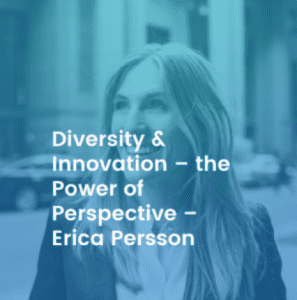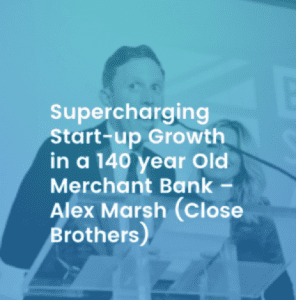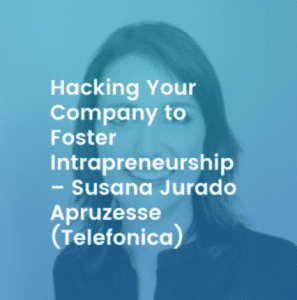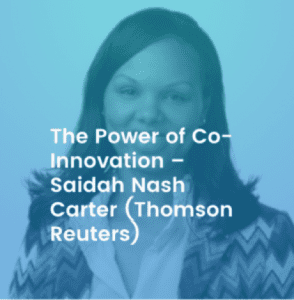Discussion with Erica Persson, Director PWC Experience Consulting

During #IntraCnf Stockholm, Erica Persson (Director PWC Experience Consulting) explored the topic of diversity and the connection to innovation in an organization, and why a new way of leading people is required for breakthrough innovation to happen. She talked about diversity as a key for future-proofing our organizations, and how it leads to business growth when leveraged to gain the power of perspective.
What inspired you to become an intrapreneur?
Erica: “I have worked as a management consultant for many years, focusing on organizational development, restructuring and working with leaders around the world trying to change and optimize their organizations in order to grow, make more money and drive less cost.
What I have found over time is that structure and organization is not always the answer when you are trying to move an organization forward – often it’s rather setting people free from structure, frameworks and boundaries to allow them to come through with their great ideas, and to give them the platform to really drive change.
When I saw the opportunity a few years ago to start building up an internal ecosystem for innovation (at my former company) I simply thought it was a brilliant opportunity to start working on just that – giving the people around me a better shot at impacting in their workplace and with that – really have impact on the course of our success.”
Do you try to connect to other intrapreneurs outside of your organization?
Erica: “Yes! If there is something I have learnt, it’s the value of diverse networks that truly gives perspective on what you are trying to solve and solve for.
The cool thing with innovation and intrapreneurship is that the value always ends up higher when you collaborate, even if it’s a bit scary to share your ideas and thoughts at an early stage at times.”
What is the biggest struggle with being an intrapreneur for you and on the other hand what is the biggest reward?
Erica: “The biggest reward for me is seeing change happen, feeling the organization and the people grow, and to cut through the fear and discomfort innovation brings with it…Which is also the biggest struggle as I see it.
For true breakthrough innovation to happen, we need to force ourselves into situations that are not easy, comfortable or necessarily part of our nature.
It requires the courage to act differently, to interact with new people with different perspectives and ideas and to grow a leadership within the organization that rewards that type of disruptive behavior. It simply takes stamina to stand tall through the process of change.
Discussion with Alex Marsh, Managing Director, Close Brothers Retail Finance

Alex Marsh is the Managing Director of Close Brothers Retail Finance, a rapidly scaling consumer finance digital business that helps specialist UK retailers unlock growth. As an internal start-up venture, they had to break away from the traditional banking approach to reach a new audience and come to the rescue of specialist retailers, supporting over 750 retailers and 150,000 customers since 2014.
What inspired you to become an intrapreneur?
Alex: “I fell into being an intrapreneur by mistake. I’d been leading the bank strategy team at Close Brothers for a number of years and through this we had completed both acquisitions of new product lines and a couple of new ventures by hiring experienced teams who were looking for funding. Back in 2014 when we decided to launch Close Brothers Retail Finance, this was the first time we had decided to build a startup business from scratch based on bringing together our expert people from within the Bank.
Fast forward 2 years to 2016 and by this stage we had completed a 2-year pilot and initial roll-out of Close Brothers Retail Finance and go-ahead was given for full roll-out. I had already been pushing for a leadership role and it was a huge honour for this specific opportunity to swing back to me, from helping to develop the business case in 2014 to suddenly being appointed as Managing Director in 2016.
The past year as MD and as an intrapreneur has challenged my commercial capabilities and resilience to their limits (and beyond a few times).
But I can honestly say I feel so much more at home in a business where we can quickly shape our culture and further enhance our proposition – and the resultant impact on our financial results is so rapid.
I’d absolutely struggle to go back to corporate head office role any time soon – mainly because I find the office space so quiet compared to the loud hustle and bustle of our business from all the active collaboration of the team.”
How do you explain other people what you do? What kind of reactions do you get?
Alex: “Having originally trained as accountant and started out in audit (not the greatest conversation maker in the pub!) and then moved to work at a bank during the credit crunch (walking to the office past chants of ‘banker w*nkers’) I’ve never been prouder to describe what I do now – leading a rapidly scaling consumer finance digital business that helps specialist retailers unlock growth.
The fact that we’re now the fastest growing retail finance provider in the UK with many very happy partner retailers, and have picked up a couple of industry awards along the way just adds to that sense of pride.
The main question I do get is ‘But don’t you work at Close Brothers? Aren’t they big and really old – what do you mean start-up?’.
We do come across a certain amount of scepticism about how we can bridge the gap between the start-up community and merchant banking – but as a team we enjoy the fact we’re doing something unexpected, disrupting an established market with innovative technology and industry leading product insights and customer analytics, whilst absolutely delivering a proposition that stands by the long-held principles of our group – building loyal relationships based on service and expertise.
Being an intrapreneur sometimes means taking the problem back home with you. What are the ways in which you disconnect from the problem that you are trying to solve?
Alex: “I can definitely relate to this, with a brain that never seems to stop racing with ideas
and questions – I think my wife and brothers probably feel like they deserve to be on the Close Brothers Retail Finance payroll…. Even my 6 year old daughter Isabelle can rattle off the names of our team members and retailers!
To help switch off, I’m a very keen long-distance runner – both for the physical and mental benefits – a chance to un-hunch my shoulders and empty my brain from too many hours in meetings or on the laptop. I also love the social side to running and you’ll often find me running (and talking) around my hometown of Brighton along the coast or the South Downs with my brothers, Nick and Greg.
That said it’s not all about the zen, as it’s also a great outlet for my competitive streak – most recently I joined a team of 6 from Close Brothers to complete a 100km ultra-marathon for a local charity. Next year we’re hoping to go back with a larger team of 20, raise more money for charity and shave a couple of hours off our time.”
Do you try to connect to other intrapreneurs outside of your organization, and if so how do you do it?
Alex: “This has definitely been a journey for our business, team and myself. When I first came into role we were quite inwardly focused, trying to find all the answers ourselves and at times reinvent the wheel. We had also adopted ways of working and a culture that was much more alike to our established corporate group than a start-up.
The turning point for us was a chance encounter with a consultant from Market Gravity, Heidi O’Leary, who heard about our disruptive proposition and suggested we entered ourselves in the Corporate Entrepreneur Awards for New Business Launch. We were incredibly fortunate to win this award and through this open our eyes to what felt like a hidden world of intrapreneurs – all facing very similar challenges and struggles as they seek to innovate and help their larger corporate organisations adapt and evolve.
This is the appeal of events like the Intrapreneurship Conference where we can meet other intrapreneurs, share practical advice and ideas, and importantly build networks that can lead us to whole new unexpected opportunities.”
What is the biggest struggle with being an intrapreneur for you and on the other hand what is the biggest reward?
Alex: “The biggest struggle for me as a intrapreneur is trying to strike the right balance between taking risks to get things done and drive growth in our business – whilst being mindful that we are part of a traditional merchant banking group, with an unparalleled track record and unblemished reputation over the past 140 years.
This can create conflicts between my team and the internal stakeholders I am responsible for managing – and unfortunately as the leader of the business you can find yourself stuck in no man’s land between both parties.
To bring that to life, nothing pains me more than having to say no to a retailer who approaches us for help, but we cannot support due their sector or product being outside of internal appetites or policies.
The biggest reward is when all the pieces of the puzzle finally come together – leveraging the fast forward thinking culture of our start-up team with the incredible depth of expertise within our group. In the past fortnight alone, against all the odds and crazy deadlines, we’ve supported on the consumer financing of a major retailer product launch, where I’m confident no other retail financier has the dynamism and broader bank capabilities to have done this.
As the saying goes ‘what comes easy won’t last, what lasts won’t come easy’.”
Discussion with Susana Jurado, Head of Portfolio-Product Innovation at Telefonica

As Head of Portfolio-Product Innovation at Telefonica Susana Jurado is working with intrapreneurs on a daily basis.
During #IntraCnf Stockholm, Susana shared the nuts and bolts of their innovation framework Lean Elephants. In the last 5 years Telefónica I+D has been applying the Lean Startup methodology to innovation, and becoming pioneers within the corporate world in the application of this methodology.
Managing innovation as a portfolio of internal startups has changed the way of working of the innovation projects leaders becoming true intrapreneurs.
The Lean Elephants framework has allowed Telefónica to speed up the innovation process and do more with less, with a clear focus on market and customers, but also foster intrapreneurship in the whole company.
What are the qualities that in your opinion make a good intrapreneur?
Susana: “A good intrapreneur has the qualities of a good entrepreneur like vision, focus, passion, initiative, risk-taker, resilience, relationship-builder and open-mindedness, but also needs additional qualities like a deep knowledge of the different organisations and processes of the company and an extended network of contacts in the company (you’ll need to ask for a lot of favors inside the company).
An intrapreneur has to find a place for his/her product in the market but also inside the company, hence you need to be able to gain stakeholders from different organisations inside the company that will support your project.”
How do you choose the people who join the program?
Susana: “They choose themselves. Not everybody likes or is willing to become an intrapreneur, not everybody loves autonomy and making decisions, not everybody is willing to deal with uncertainty and risk.
I have learnt that in a big company like Telefónica you can find these talent internally, they are just waiting for an opportunity to emerge and become visible.
We periodically launch innovation calls where employees can submit their ideas for innovation projects, if their idea is selected and becomes an innovation project, they get the chance to lead it and devote 100% of their time to make it real. Hence innovation calls is a good way to identify this talent and to give them an opportunity to, voluntarily, become intrapreneurs.
What are the reactions to the program from other employees that are not involved? And how do you communicate what you do with them?
Susana: “Our innovation calls go beyond the innovation organization: employees from other areas within the company can also submit their ideas and become intraprenuers of this program.
As mentioned, not everybody is willing to become an intrapreneur, but those that are willing get really engaged. In fact, we have several people that have participated sending ideas 2 or 3 different calls, even if their ideas haven’t been selected. The innovation calls has become a way to foster intrapreneurship in Telefónica, they were born in the Innovation organization but are currently being exported to the business units in several countries.
To reach the rest of the company we rely on the different internal communication channels (newsletters, company meetings, executive committees, etc.) we have in the company the goal to reach as many people as possible. But we also communicate externally, because getting recognitions externally can also give you a lot of credibility internally.”
Discussion with Saidah Nash Carter, Senior Vice President of Innovation Africa, Thomson Reuters

Saidah Nash Carter is the Senior Vice President of Innovation Africa at Thomson Reuters.
During #IntraCnf Stockholm, Saidah gave a talk on the power and the necessity of co-creation. As the world’s challenges are becoming more complex, it is increasingly necessary to form true partnership focused on outcomes that benefit not only the partners but also the greater good.
There is an African proverb that says: “If you want to go fast, go alone. If you want to go far, go together” – and for Saidah this certainly rings true now more than ever before.
Saidah: “Possibilities are unleashed when we are able to look through a new lens – one that is supportive of- and open to- innovation and co-creation. Co-creation has the potential to truly shift how companies and organizations approach a common goal and by drawing on the strengths of all stakeholders involved, it results in a win-win outcome for everyone. With authentic connections and passion we create a runway to think big and solve big.”
What inspired you to become an intrapreneur?
Saidah: “I’ve always been someone who follows my curiosity. I also love developing new relationships and solving for gaps or unmet opportunities. This combination would usually guide me to a new business or new product development focus in my work.
In many ways becoming an intrapreneur was an accident of habit. I have developed a strong enough network over the years to champion projects that I believe are important for the company. Thankfully, I know our business pretty well so people listen from time to time.
My last few roles didn’t exist in the organization before me, and that is more a testament to Thomson Reuters openness and flexibility than it is to my job description writing skills.
I do also have my frustrating days and I suffer from the “big company innovation blues” just like my peers in corporate innovation elsewhere.
But innovation, integrity and positive impact are core elements of our company DNA and there is an energy and commitment in the people I work with that make every bit of the frustration worth it.
We also had the opportunity to visit several innovation centers across the city. Ericsson, 3M, Google, SUP46 and Epicenter welcomed our group of intrapreneurs and showcased how strong the innovation ecosystem is in Stockholm. We invite you to follow our twitter feed #intracnf for the latest updates.
Happy innovation!
About the author
 Hans Balmaekers heads up the Intrapreneurship Conference, the #1 global platform for corporate innovators to understand best practices and connect with like-minded peers. Fueled by a belief in the potential for big business to have a positive impact for the world, his ventures are all about creating opportunities for learning and collaboration. All driven by a simple question: are we learning as fast as the world is changing?
Hans Balmaekers heads up the Intrapreneurship Conference, the #1 global platform for corporate innovators to understand best practices and connect with like-minded peers. Fueled by a belief in the potential for big business to have a positive impact for the world, his ventures are all about creating opportunities for learning and collaboration. All driven by a simple question: are we learning as fast as the world is changing?
Featured image via Yayimages.







